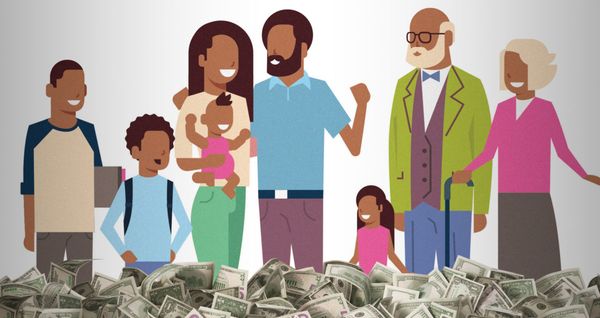Wealth inequality is a pervasive and persistent problem in many societies, including the United States. One of the main factors contributing to this issue is systemic racism and discrimination, which have long been used to marginalize and oppress certain groups of people. These practices have led to unequal access to opportunities and resources, such as education, housing, and employment, crucial for building and maintaining wealth.
Racism and discrimination have a particularly damaging impact on the wealth of Black and other minority communities. For example, Black Americans are far less likely to own their own homes and businesses compared to white Americans, even when controlling for income and other factors. This is partly because of the legacy of redlining, segregation, and other discriminatory policies that have denied Black people access to affordable and desirable neighborhoods, as well as the effects of ongoing discrimination in the lending and other financial services. As a result, Black households have significantly less wealth on average than white households, which has serious consequences for their financial stability and future prospects.
Gender and Education
The intersection of racism and other forms of inequality, such as gender and education, further exacerbates the wealth gap. For instance, Black women are more likely to live in poverty and face other economic challenges than white women and Black men. This is partly due to the double discrimination they face based on both their race and gender, as well as the limited opportunities and resources available to them. Similarly, Black and other minority students are more likely to attend underfunded and underperforming schools, which reduces their chances of getting a good education and preparing for well-paying jobs.
It is important to recognize and address the role of systemic racism and discrimination in perpetuating wealth inequality. This can be done through various measures, such as implementing fair housing and lending policies, investing in quality education for all, and promoting diversity and inclusion in the workplace. But, ultimately, reducing wealth inequality requires a concerted effort to dismantle the systemic barriers that have held back Black and other minority communities for far too long.
Reparations
One important aspect of addressing systemic racism and discrimination in relation to wealth inequality is reparations. Reparations refer to compensating those harmed by historical injustices and discrimination, such as the legacy of slavery and Jim Crow laws in the United States. This could take the form of financial compensation, land grants, or other forms of restitution. Reparations could be a powerful tool for addressing wealth inequality and helping to build a more just and equitable society, as it would provide a means for Black and other minority communities to begin to recover some of the wealth that has been taken from them over centuries of systemic oppression.
Another way to address wealth inequality is through policies promoting economic mobility and providing a safety net for struggling people. For example, a progressive tax system that includes a wealth tax on the very wealthy and investments in social programs such as affordable housing, health care, and child care could help to level the playing field for Black and other minority communities. Additionally, policies to increase the minimum wage and strengthen labor protections would help raise the standard of living for low-income workers, many of whom are Black and other minorities.
It's also important to recognize that wealth inequality is not a problem that individuals can solve alone. It's a structural problem that requires structural solutions. This means that it's not enough to provide education and training opportunities to Black and other minority communities. The challenge is ensuring that these opportunities are available to all, leading to good jobs with fair pay and benefits. This requires creating policies that help raise the floor for all workers and ensure employers are held accountable for providing fair wages and benefits.
In short, addressing wealth inequality requires a multi-faceted approach that addresses the root causes of systemic racism and discrimination. This includes reparations, progressive tax policies, investments in social programs and economic mobility, labor protections, and other measures that help to level the playing field and provide opportunities for Black and other minority communities to build wealth. It's important to recognize that these issues are intertwined and that addressing wealth inequality requires addressing other forms of inequality too. We can only create a truly just and equitable society by taking a comprehensive approach.
Power and Opportunity
One important thing to remember about wealth inequality is that it's not just about money. It's about power and opportunity too. So, for example, if you're a person of color, you're more likely to get pulled over by the police for no reason. And let's be real, getting pulled over is never fun. But, getting pulled over when you haven't done anything wrong, and you know that the only reason you're getting pulled over is because of the color of your skin, is even less fun.
Another thing to remember is that wealth inequality affects people differently based on their gender too. Women, for example, are more likely to live in poverty than men. This is especially rough when you consider that poverty is like a game of Tetris, but instead of blocks, it's bills, and instead of music, it's the sound of your bank account crying.
Education is a key factor in perpetuating wealth inequality, as communities of color often have less access to quality education. Think of it like this: education is like a magic wand that can take you to all sorts of exciting places, but if you're a person of color, the wand is likely to be broken or made of plastic, and it's not going to work as well as the fancy wand that white kids get.
Wealth inequality is a serious issue that affects many aspects of our lives. Still, adding a little bit of humor can make it more relatable and easier to understand. We should work towards a more equitable society that gives everyone equal opportunities to succeed.








